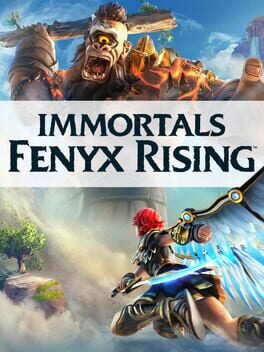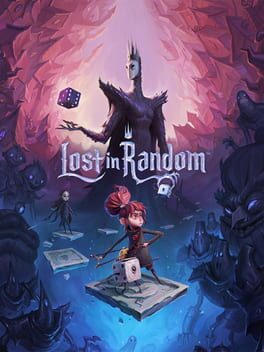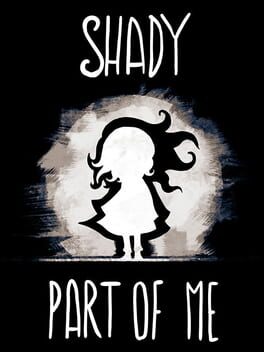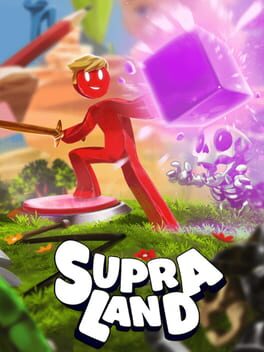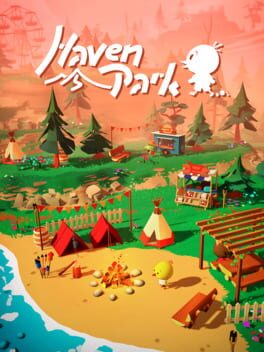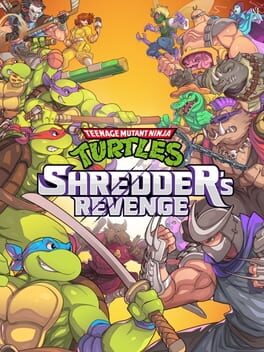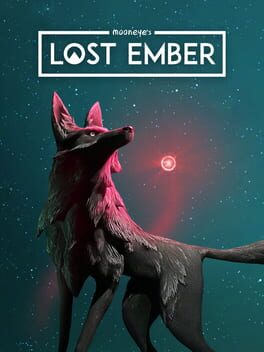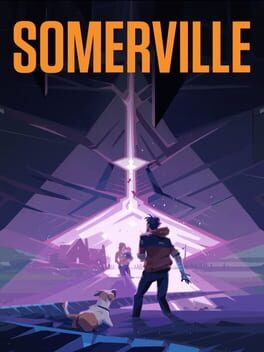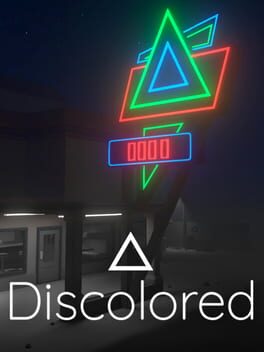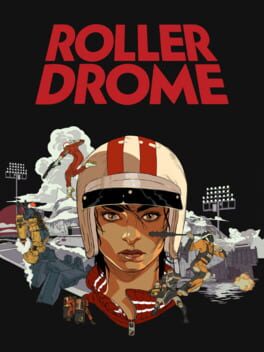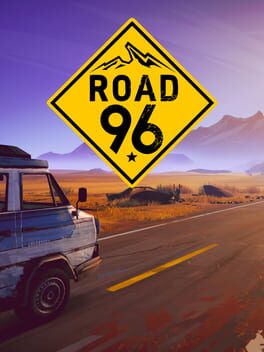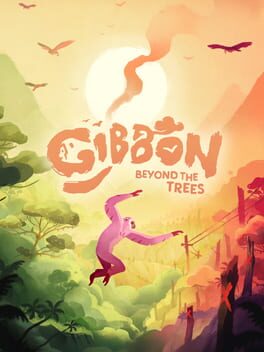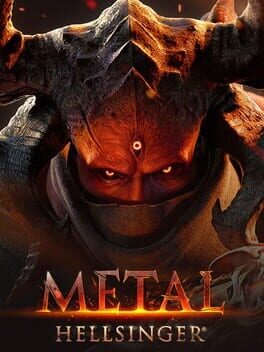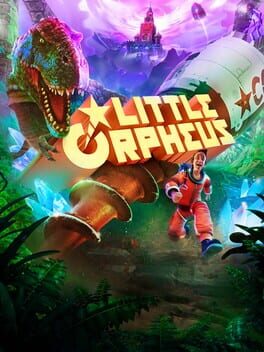Mancheg00bfusc8r
I haven't touched this game in about six months, and after finally admitting to myself that I'm probably not coming back to it anytime soon, I uninstalled it and decided to write up my thoughts here. Yes, it's very much an Ubisoft open-world take on Breath of the Wild, but it's pretty good as such, with fun combat and puzzles that are decently integrated into the world, on top of the many, many Vaults (its equivalent of BOTW's Shrines, which unfortunately all have similar stone-platforms-floating-in-a-starry-void aesthetics). I ended up shelving it while I was only midway through the second of five or so major areas, but I think that's more a reflection of my personal taste and preference for shorter games than of Immortals' quality; I've never played BOTW or TOTK, but I'm fairly certain I'd end up dropping them well before the end as well. Maybe I'll come back to it the next time I get a craving to play a Zelda-like on PC, IDK.
2021
Gave this one a couple hours and I don't think it's going to be for me. The art direction, presentation, world-building, and production values are all pretty great, and the combat is fun with an interesting injection of dice and card mechanics into real-time battles, but there simply isn't enough to do aside from combat and fetch quests, and consequently the world isn't much fun to actually explore; this is a game badly in need of platforming or additional puzzle elements in between battles. It also doesn't help that the map isn't very useful, showing which zone of the level you're currently in but not where you are within it. Thunderful should have made this into an animated series or a proper action-adventure game instead, sorry.
2020
Solid puzzle-platformer where you switch between a girl who can move in 3D (but can’t jump) and her shadowy 2D-platforming counterpart. Maybe slightly longer than it needed to be, and the difficulty curve is a bit out of whack (the puzzles steadily ramp up in challenge for the first two acts, then get much easier for a longish stretch before ramping back up again in time for the end), but a strong execution of this concept overall.
2019
An extremely impressive effort for a solo developer, mashing up first-person puzzlers, Metroidvanias, and a dash of Zelda and collectathon platformers. Lots of clever environmental puzzles that are well-integrated into the exploration, and lots of rewards for carefully exploring nooks and crannies. that said, it does start to overstay its welcome before the end, and it very much suffers from a lack of design polish: the map is an optional collectible you don't get until quite far into the game and is the top-down 2D kind, which is definitely not adequate for finding your way around this kind of dense, interconnected, and heavily vertical world; while many of the puzzles are very satisfying to solve, others lack sufficient visual or auditory feedback about what a given switch does or what exactly your objective is; and the combat is generally awful and mainly serves to get in the way of the exploration and puzzle-solving (most action-adventure games have the sense to maintain a decent degree of separation between combat and puzzle areas so that enemies don't interrupt you while you're trying to solve a puzzle, but sadly not this one). Will give Six Inches Under a try at some point now that it's on Game Pass; hopefully, it sands down some of the original's rough edges a bit.
2021
Haven Park is adorable, there are much worse indie games to rip o… er, homage than A Short Hike, and the blend of basic ASH-style open-world exploration with a very simple campsite management game is fun for an hour or two, but trudging around the map in search of additional resources or new campsites gets stale pretty quick, and there isn’t much else to do beyond that. Apparently, the minimalist map, lack of fast travel, and sparse signposting (mainly limited to a few literal signposts here and there) were deliberate design choices on the developer’s part, but that doesn’t mean I have to think they were good ideas.
A game that sets out to do one very specific thing - it's a 2D side-scrolling beat-em-up designed in the style of early '90s arcade brawlers, and most specifically homaging the Konami beat-em-ups based on this very same license - and does that one thing extremely well, with excellent pixel art and animation, simple but enjoyable fighting mechanics, and lots of references to the old TMNT cartoon that probably went over my head, even speaking as someone who watched that show as a kid.
All that said... even though I have some affection for this IP, and a lot of affection for '90s arcade beat-em-ups (though I definitely prefer Capcom's to Konami's, for what that's worth), it's 2023, and I like my brawlers to have more depth than this, as well as level design more mechanically interesting than left-to-right corridors filled with enemies and a few simple obstacles here and there. Also feels a bit too long for the sort of game this is; at 16 stages, I believe a single playthrough is approximately the length of the original TMNT arcade game and Turtles in Time combined. Like I said above, Shredder's Revenge is setting out to do something very specific and I can't fault it too much for not trying to be a different kind of beat-em-up than it is, but it turns out my tastes in gaming have changed too much over the past few decades for me to be fully on board with it.
All that said... even though I have some affection for this IP, and a lot of affection for '90s arcade beat-em-ups (though I definitely prefer Capcom's to Konami's, for what that's worth), it's 2023, and I like my brawlers to have more depth than this, as well as level design more mechanically interesting than left-to-right corridors filled with enemies and a few simple obstacles here and there. Also feels a bit too long for the sort of game this is; at 16 stages, I believe a single playthrough is approximately the length of the original TMNT arcade game and Turtles in Time combined. Like I said above, Shredder's Revenge is setting out to do something very specific and I can't fault it too much for not trying to be a different kind of beat-em-up than it is, but it turns out my tastes in gaming have changed too much over the past few decades for me to be fully on board with it.
2019
This review contains spoilers
I have a lot of fondness for the Journey/Abzu/GRIS/etc. style of gameplay-light story-driven exploration game, and Lost Ember manages to hit enough of those buttons to compel me to finish it, but man, is this lacking in polish. Too long for this subgenre (levels are too large relative to the amount there is to do in them, tedious optional collectibles aside), too much dialogue, too many poorly signposted areas leading to aimless wandering, and too many instances where the controls and level design can get you stuck in a spot to the point where you’re forced to restart from the last checkpoint (admittedly never a huge setback here, but that wouldn’t be an issue at all in a more tightly designed game). How on earth did this get 90% from PC Gamer?
Oh, and the story attempts to apply horseshoe theory to its two ideological poles of “revolution to overthrow an oppressive regime” and “licking said regime’s boots,” so fuck that. Who wrote this, Ken Levine?
Oh, and the story attempts to apply horseshoe theory to its two ideological poles of “revolution to overthrow an oppressive regime” and “licking said regime’s boots,” so fuck that. Who wrote this, Ken Levine?
2022
Despite being heavily marketed on having its development led by ex-Playdead staff, Somerville proves to be a significant downgrade from Inside in about every possible way (poor optimization, some unnecessarily confusing level design, a story with interesting ideas that fails to stick the landing or imbue its endings with the intended weight); still, its puzzles, art direction, and set pieces are solid enough that it’s worth playing for fans of short, very linear cinematic action-adventure games, especially while it’s on Game Pass.
(I can’t really call this a “cinematic platformer” when there’s no jumping, though its linearity and cinematic pacing make that subgenre the closest point of comparison.)
(I can’t really call this a “cinematic platformer” when there’s no jumping, though its linearity and cinematic pacing make that subgenre the closest point of comparison.)
2019
2005
I'm sorry, everyone, I really tried to get into this one, but I just couldn't get past the bizarre control scheme, poorly explained mechanics, questionable checkpointing, and infrequent save points. The art direction and weird atmosphere are great and I have no doubt that this could be a much better game with some QOL tweaks and accessibility settings, but as is, I'd much rather watch a playthrough or a YouTube analysis video than attempt to play this again.
2022
A pretty fun set of core mechanics that combine Tony Hawk-style extreme sports with Max Payne-esque bullet-time shooting, and with great art direction to boot. unfortunately, the actual game that Roll7 built around all that is rather lacking; it fails to significantly iterate or expand on its core mechanics much beyond the first few stages, even with a few new weapons, and levels are too long, with their repetitive level and encounter design getting stale awfully fast. I also found the most basic enemies to be the most fun to kill, which is kind of a problem for a shooter, and the game only intermittently lands the feeling of flow that should be so essential to such a combo- and score-driven game.
Maybe it’s just that I suck at it, but it’s ultimately not for me; still worth checking out just to play around with the mechanics for a few stages, but I’d only recommend it on sale.
Maybe it’s just that I suck at it, but it’s ultimately not for me; still worth checking out just to play around with the mechanics for a few stages, but I’d only recommend it on sale.
2021
Given that this is DigiXart's first attempt at a novel concept (a partially-procgen narrative game with vaguely roguelike-inspired progression, though the game itself is definitely not a roguelite), it turned out quite well, with a mostly compelling cast of characters and a lot of narrative and mechanical variety across the episodes you'll stumble into along your road trip. The relatively short length of each episode helps break the pacing up and keeps it feeling fresh, as well.
That said, I do have some significant caveats: the various episodic interactions with the supporting characters tend to demand a lot of suspension of disbelief on the part of the player, as they frequently involve characters divulging personal information or making other implausible requests to a teenager they just met. The narrative's overarching premise of "road trip to escape a totalitarian state" is also handled in about as thoroughly apolitical a manner as possible, with little to no attempt on DigiXart's part to flesh out the ideology of the state, the Black Brigades group rebelling against it, or the nature of its internal repression, or why it is that teenagers seem to be the only ones trying to cross the border. Road 96 is still well worth playing for fans of narrative games and I enjoyed the large majority of my time with it, but its failure to engage more substantively with its own premise is a significant missed opportunity.
also, forgot to mention that there's a song that plays a lot in this that sounds way too much like Train's "Hey, Soul Sister" for its own good
That said, I do have some significant caveats: the various episodic interactions with the supporting characters tend to demand a lot of suspension of disbelief on the part of the player, as they frequently involve characters divulging personal information or making other implausible requests to a teenager they just met. The narrative's overarching premise of "road trip to escape a totalitarian state" is also handled in about as thoroughly apolitical a manner as possible, with little to no attempt on DigiXart's part to flesh out the ideology of the state, the Black Brigades group rebelling against it, or the nature of its internal repression, or why it is that teenagers seem to be the only ones trying to cross the border. Road 96 is still well worth playing for fans of narrative games and I enjoyed the large majority of my time with it, but its failure to engage more substantively with its own premise is a significant missed opportunity.
also, forgot to mention that there's a song that plays a lot in this that sounds way too much like Train's "Hey, Soul Sister" for its own good
a charming, beautiful, and very short auto-run platformer with great tree-swinging traversal mechanics. could have used a bit more time in the oven, with some annoying difficulty spikes (it's not a hard game by any means, but a sequence where you're chased by hunters feels at odds with the relaxing nature of the earlier chapters) and ran into a couple bugs that I was able to fix by reloading my save, but still a nice little one-sitting play.
2022
More or less a lower-budget, shallower, more repetitive take on Doom 2016/Eternal with the addition of a rhythm gimmick, and while that’s fun enough for a few hours, it didn’t prove enough to sustain my interest for the entire campaign, even given its relatively short length. Also really not a fan of finite continues or the lack of any mid-level autosaves, features which are present here even on the lowest difficulty setting (granted, this fits with the overall score-based, leaderboard-focused design approach, but why force that on players who just want to play through the campaign from beginning to end?).
Admittedly, I did suck at the rhythm aspect and used the Rhythm Assist feature (all your actions are always on beat, and failing to press the buttons in time only means the difference between “good” and “perfect”) for most of my time with it; players who are better at rhythm games may well find this one more engaging.
Admittedly, I did suck at the rhythm aspect and used the Rhythm Assist feature (all your actions are always on beat, and failing to press the buttons in time only means the difference between “good” and “perfect”) for most of my time with it; players who are better at rhythm games may well find this one more engaging.
2020
As cinematic platformers go, Little Orpheus is definitely on the simpler and easier side, with puzzles and platforming that don't exactly demand much of the player; I've seen others label this a side-scrolling walking simulator, which is understandable even if I don't quite agree with that classification. That said, the presentation, visuals, art direction, and short playtime still make this worth checking out for fans of the genre.
